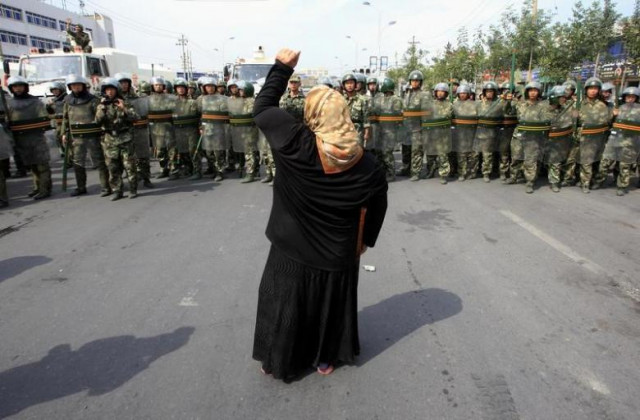China sets rules on beards, veils to combat militancy in Xinjiang
Workers in public spaces like stations and airports will be required to 'dissuade' those who fully cover their bodies

A local woman on a crutch shouts at Chinese paramilitary police wearing riot gear as a crowd of angry locals confront security forces on a street in the city of Urumqi in China's Xinjiang Autonomous Region July 7, 2009. PHOTO: REUTERS
Hundreds of people have died in recent years in Xinjiang, home to the Muslim Uighur people, in unrest blamed by Beijing on militants and separatists, though rights groups say the violence is more a reaction to repressive Chinese policies.
The government strongly denies committing any abuses in Xinjiang and insists the legal, cultural and religious rights of Uighurs, a Turkic ethnic group, are fully protected.
Chinese police kill three rioters in Xinjiang
While China officially guarantees freedom of religion, authorities have issued a series of measures in the past few years to tackle what it sees as a rise in militancy.
New legislation, passed by Xinjiang lawmakers on Wednesday and published on the region's official news website, widens existing rules and will come into effect on April 1.
Workers in public spaces like stations and airports will be required to 'dissuade' those who fully cover their bodies, including veiling their faces, from entering, and to report them to the police, the rules state.
It will be banned to "reject or refuse radio, television and other public facilities and services", marrying using religious rather than legal procedures and "using the name of Halal to meddle in the secular life of others".
Chinese Communist Party stresses anti-Islam narrative
"Parents should use good moral conduct to influence their children, educate them to revere science, pursue culture, uphold ethnic unity and refuse and oppose extremism," the rules say.
The document also bans not allowing children to attend regular school, not abiding by family planning policies, deliberately damaging legal documents and "abnormal growing of beards and naming of children to exaggerate religious fervour".
A number of bans on select 'behaviours' had previously been introduced in some places in Xinjiang, including stopping people with head scarves, veils and long beards from boarding buses in at least one city.
The new rules expand the list and apply them to the whole region.
China targets parents in new religion rules for Xinjiang
While Uighurs have traditionally practiced a more relaxed form of Islam, the popularity of veils for women in particular has grown in recent years in what experts say is an expression of opposition to Chinese controls.
After a period of relative calm, there has been a rise in violence in recent months in the Xinjiang's southern Uighur heartland and a large increase in security.
Chinese President Xi Jinping called for a "great wall of iron" to safeguard Xinjiang during the annual meeting of China's parliament earlier this month.



















COMMENTS
Comments are moderated and generally will be posted if they are on-topic and not abusive.
For more information, please see our Comments FAQ